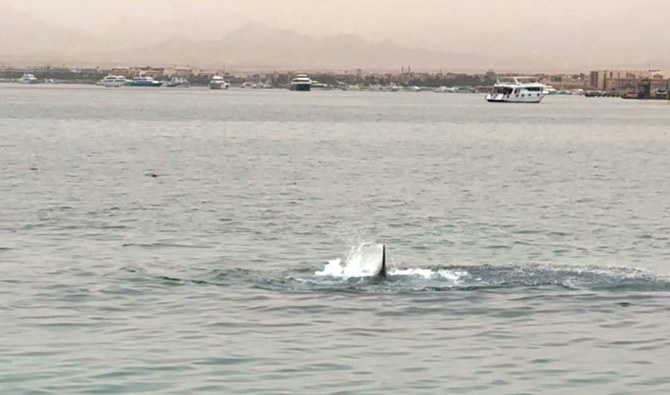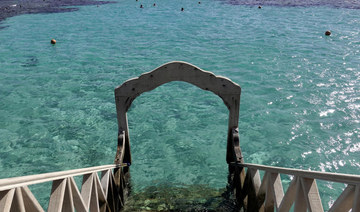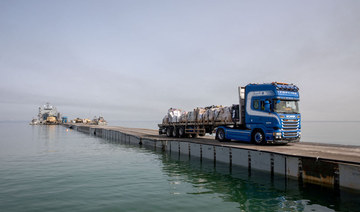RIYADH/CAIRO: Egypt, a land of ancient treasures and stunning beaches, has long been a magnet for tourists from around the world. However, in recent years, the country’s tourism sector has faced numerous challenges, including the impact of COVID-19, sporadic incidents of terrorism, and shark attacks.
Unlike terrorism and the pandemic, however, shark attacks are relatively common. Last week’s fatal attack on a Russian tourist, captured in horrific detail in a viral video, has forced Egyptian authorities to address the constant threat posed by the sea’s 49 different known species of shark.
Indeed, the number of sharks occupying the Red Sea is thought to be rising, owing to migrations from the Indian Ocean driven by human activity and a changing climate, making contact with humans ever more likely.
The victim of the June 8 attack, near a beach in Hurghada on the Red Sea, has been named by the Consulate General of the Russian Federation in Egypt as Vladimir Popov, a 23-year-old national.
According to Brig. Gen. Nader Allam, vice chairman of Sharm El-Sheikh City, measures have been taken to protect tourists in the wake of the attack.
“The city has decided to deploy rescue teams on all beaches and coordinate with all relevant authorities to ensure the security and safety of tourists, in addition to providing instructions for educating tourists while in the water, whether for diving or regular swimming,” he told Arab News.
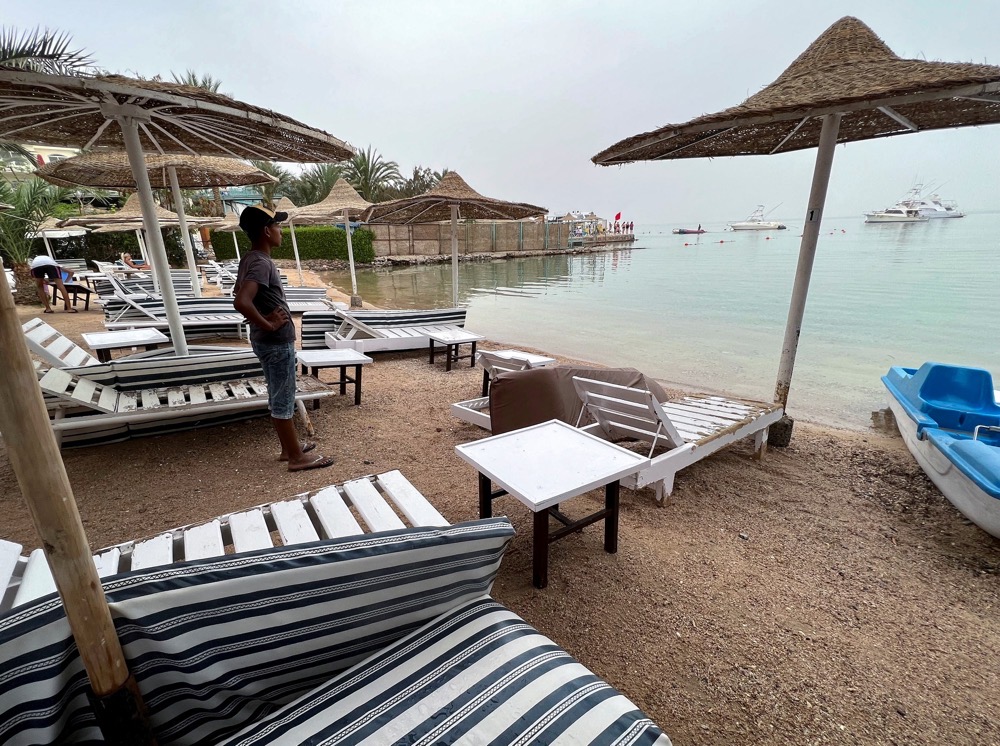
A worker stands on one of the beaches that have been closed after a Russian citizen was killed in a shark attack near a beach at the Egyptian Red Sea resort of Hurghada. (Reuters)
“Diving centers have emphasized the necessity of educating tourists, following the instructions of the diving instructor, and respecting the marine environment.”
Allam said diving centers are equipped with staff trained in marine first aid and maritime safety. They have navigational devices, life collars, life jackets, an air-conditioned cabin for transporting people, an intensive care room with essential medical equipment, and a concentrated oxygen system for emergencies.
Separately, Alaa Aqel, chairman of the Steering Committee of the Hotel Establishments Chamber of the Egyptian Federation of Tourist Chambers, told Arab News: “There (was) a periodic circular issued late last year and circulated to all hotel establishments in the Red Sea Governorate. It stipulates adherence to safety and security procedures and controls that are generally accepted and issued by the competent authorities regarding diving and snorkeling activities.”
Aqel highlighted instructions to ensure the safety of tourists, which includes not swimming in areas where sharks are found. In addition, the authorities should put up warning signs for tourists not to throw waste or leftover food into the water, and ensure there is first aid equipment on hotel beaches.
According to the Russian tour operator Tez Tour, which specializes in travel to Egypt, shark nets are available in some, though not all, hotels in Hurghada. Among them are the Albatros chain, Alf Leila Wa Leila by Neverland, Water Valley by Neverland, Dana Beach Resort, Desert Rose Resort Hurghada, and Rixos Premium Magawish.
A representative of Tez Tour said tourists who are currently on vacation in Hurghada have the option to change their hotel if they feel unsafe. To do this, they need to contact their hotel guide. “Each application will be considered individually. However, we must understand that all beaches and coasts, as well as exits to the sea, are identical, so changing the hotel will not provide tourists with qualitatively new conditions.”
Tez Tour also reported that it has not noticed a decline in sales for Egyptian destinations following the incident. “Cancellations are received in a single volume, which fully corresponds to daily norms. At the moment, the only request for resettlement has been received from tourists,” the representative told Arab News.
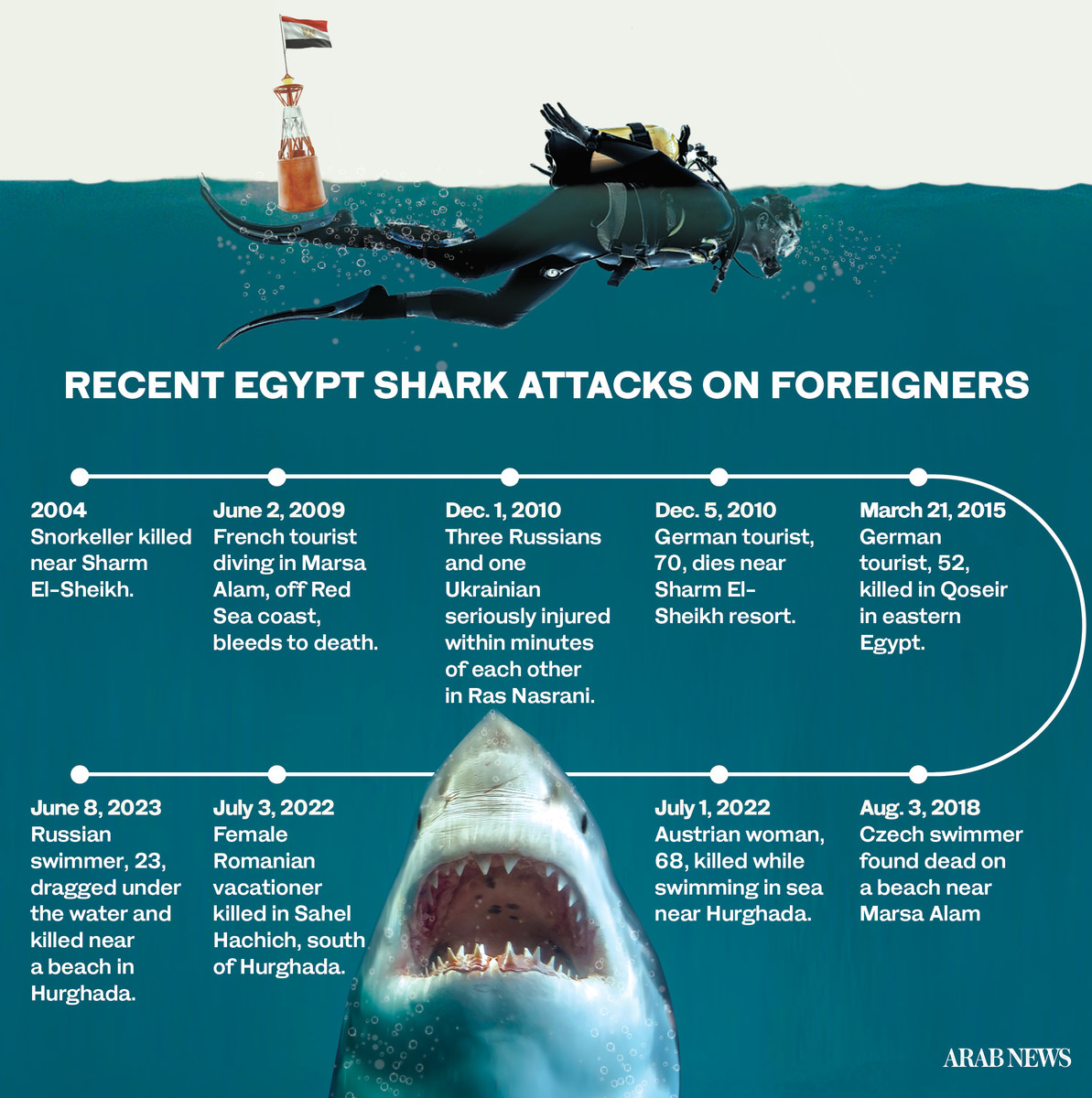
Last week’s attack, while tragic, is not an isolated incident for the popular resort towns of the Red Sea.
In 2010, a series of shark attacks occurred in five days, unusually close to the shore of tourist hotspot Sharm El-Sheikh, that resulted in the death of one German and injury to four other foreign tourists. These have led to a significant drop in tourist numbers.
In 2015, another German tourist was killed by a shark off a Red Sea beach, while in 2018, a Czech tourist was fatally attacked in similar fashion. In 2022 there were two fatal attacks, on an Austrian and a Romanian, in Hurghada within days of each other.
Egyptian nationals themselves, of course, particularly fishermen, are not immune from attacks by sharks, judging by local media reports.
And it is not just sharks the industry has to contend with. Just days after the Russian tourist was killed, three British tourists died in a fire aboard an Egyptian scuba diving tour boat off the coast of the Red Sea resort town of Marsa Alam on Sunday morning.
The recurrence of such incidents raises questions about the safety of Egypt’s waters and vulnerability of its already fragile tourism sector.
For several years, Egypt’s tourism sector had experienced steady growth, reporting its best performance in 2019, when the country welcomed a record-breaking 13.1 million visitors, generating revenues of around $13 billion.
The upward trajectory came to a halt quite abruptly, however, with the onset of the COVID-19 pandemic in early 2020. International travel restrictions, lockdown measures, and fears of contracting the virus led to a significant decline in tourist arrivals. In 2020, tourist receipts plummeted to $4 billion, representing a 70 percent drop compared to the previous year.
“The Egyptian tourism sector is one of the most important sources of foreign currency, along with exports, revenues from the Suez Canal, remittances from Egyptians abroad, and net foreign direct investment flows,” Ihab El-Gamal, an Egyptian economics researcher, told Arab News.
“Therefore, the decline in the tourism sector due to the pandemic was followed by a decrease in foreign currency reserves, accompanied by a slowdown in Egypt’s gross domestic product growth rates during the pandemic year.”

A man swims as beaches are closed after a Russian citizen was killed in a shark attack near a beach at the Egyptian Red Sea resort of Hurghada, Egypt June 9, 2023. (Reuters)
According to the World Travel and Tourism Council, the sector’s contribution to Egypt’s gross domestic product plummeted 55 percent from $32 billion in 2019 to $14.4 billion in 2020.
In 2021, revenues recovered to pre-pandemic levels, with tourists bringing in more than $13 billion, according to the Deputy Minister of Tourism and Antiquities Ghada Shalaby.
During the first quarter of the fiscal year 2022-2023, tourism revenues rose by 43.5 percent, to reach $4.1 billion from $2.8 billion a year earlier, according to the latest data by the Central Bank of Egypt.
The number of tourists coming to the country increased by 85.4 percent in the first half of 2022 to 4.9 million tourists, compared to 2.6 million during the first half of 2021.
From the beginning of 2023 until the month of April, Egypt’s tourist numbers increased 33 percent on a year-on-year basis, mainly buoyed by a weaker Egyptian pound and favorable market dynamics.
The country is targeting 15 million tourists in 2023 and 30 million in 2028, according to the Tourism Minister Ahmed Issa.
Amr El-Kady, CEO of the Egyptian Tourism Promotion Authority, pointed out that the biggest target market is Europe, led by Germany, adding that he also expects more Arabs to flock into the country with the launch of the five-year multiple-entry tourist visa.
Russia and Ukraine are also among the largest markets for Egypt, but tourist numbers have been severely curtailed by the ongoing conflict between the two nations.
Fitch Solutions expects Egypt’s tourism revenues to grow by 17.7 percent to hit $13.6 billion in 2023 and $17.9 billion by the end of 2026.
El-Gamal is confident the recent shark attack will not upset tourism’s upward trajectory and the industry’s recovery.
“As for the impact of the shark attack incident on the tourism sector, it is not expected to significantly affect tourism in Egypt, especially since such incidents can happen anywhere in the world,” he added.
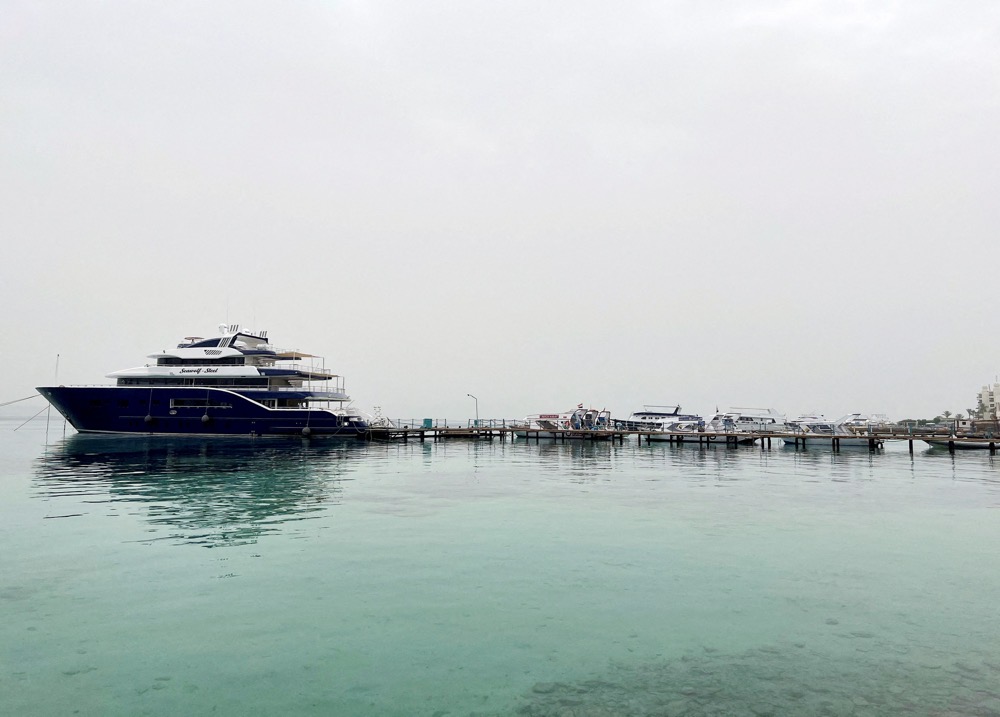
A view of one of the beaches that have been closed after a Russian citizen was killed in a shark attack near a beach at the Egyptian Red Sea resort of Hurghada. (Reuters)
Kirill Kuzishchin, professor of the department of ichthyology at Moscow State University, told Arab News that judging by its size, the predatory creature that killed Popov could have been a tiger shark that had migrated from the Indian Ocean.
Calling it a “targeted, cold-blooded attack on a human being,” he said there may be several more of these predators in the coastal zone of Hurghada. This is probably due to their seasonal migration from the Indian Ocean, and in their new habitat they become more aggressive once they do not find their usual food, he said.
According to Kuzishchin, there are no effective ways to protect swimmers from shark attacks. The market sells a lot of repellent bracelets, but when faced with a hungry and aggressive predator, these items are unlikely to be of any use, he said.
“Therefore, the surest way to protect yourself is to swim on safe beaches equipped with safety nets, do not swim behind buoys, stay away from fishing boats and do not ignore the warnings of rescuers when they ask (you) to get out of the water immediately.”
Shark attacks on people most often occur in the coastal waters of the US, New Zealand, Australia and African countries, according to Kuzishchin.
Despite the challenges faced by Egypt’s tourism industry, there are some optimistic signs pointing to a potential recovery.
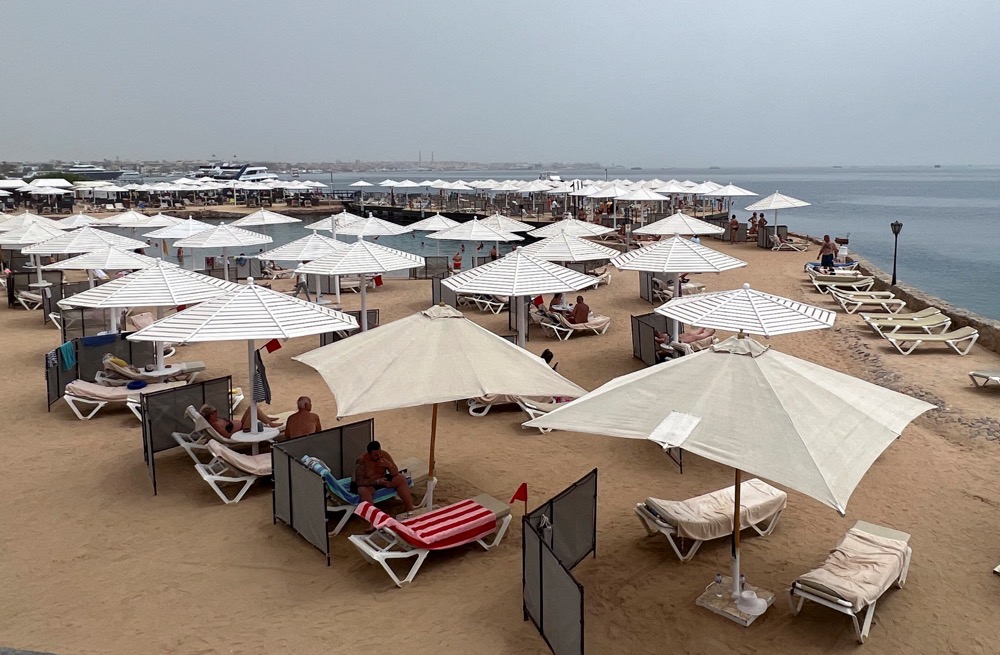
A view of one of the beaches that have been closed after a Russian citizen was killed in a shark attack near a beach at the Egyptian Red Sea resort of Hurghada, Egypt June 9, 2023. (Reuters)
To support the recovery and future growth of the tourism sector, Egypt is investing in infrastructure and adopting new visa rules. In January 2023, the Egyptian government allowed 180 nationalities to obtain tourist visas on arrival. This is only allowed if they have valid and used visas in their passports from either the UK, US, New Zealand, Japan, or the Schengen countries.
The Ministry of Transport also launched last September its first-ever online platform to regulate the entry of yachts into the country, as part of a newly developed strategy to leverage Egypt’s strategic geographical location and long coastlines.
Another notable effort is the focus on infrastructure development, including the expansion and modernization of airports to accommodate increased tourist arrivals.
Additionally, the Egyptian government has invested in upgrading road networks, improving connectivity between popular tourist destinations, and enhancing transportation services to facilitate travel for visitors.
Hosting COP27 has also played an important role in enhancing Egypt’s position as a leader in the Middle East and Africa in matters of climate change and sustainable development issues. Egypt used that opportunity to showcase its efforts and achievements in reducing greenhouse gas emissions, promoting renewable energy, and addressing environmental challenges, which can all have indirect positive impact on the country’s tourism.
Some analysts, however, suggest that Egypt should focus on diversifying its tourism offerings beyond the traditional historical sites and beach resorts. Investments in cultural tourism, eco-tourism, and adventure tourism can attract a broader range of visitors and mitigate the impact of external shocks.
The general consensus is that the June 8 shark attack, while a setback for Egypt’s tourism industry, does not spell the end of its revival hopes. The sector has shown resilience in the face of past adversity.
Given the ongoing efforts to diversify tourism offerings, and infrastructure development plans, Egypt clearly remains committed to rebuilding its tourism sector.
While caution and increased safety are imperative, the allure of Egypt’s rich history, compelling landscapes, and hospitality will continue to draw tourists. With the right strategies and a concerted effort from stakeholders, Egypt has the potential to bounce back and reclaim its position as a top global destination.




